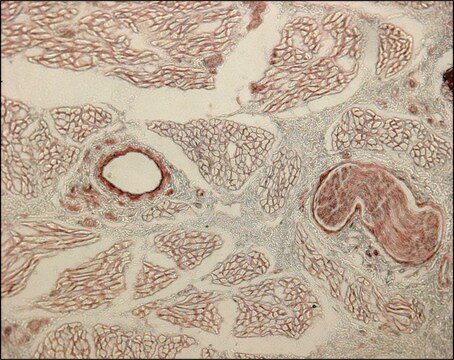MAB3392
Anti-Collagen Type III Antibody, clone IE7-D7
clone 1E7-D7, from mouse
别名:
collagen, type III, alpha 1, collagen, fetal, Ehlers-Danlos syndrome type IV, autosomal dominant, alpha1 (III) collagen, collagen alpha-1(III) chain
登录查看公司和协议定价
所有图片(1)
About This Item
分類程式碼代碼:
12352203
eCl@ss:
32160702
NACRES:
NA.41
推荐产品
生物源
mouse
品質等級
抗體表格
purified immunoglobulin
抗體產品種類
primary antibodies
無性繁殖
1E7-D7, monoclonal
物種活性
rat
物種活性(以同源性預測)
human (based on 100% sequence homology)
技術
ELISA: suitable
immunohistochemistry: suitable
western blot: suitable
同型
IgG1κ
NCBI登錄號
UniProt登錄號
運輸包裝
wet ice
目標翻譯後修改
unmodified
基因資訊
human ... COL3A1(1281)
一般說明
Type III collagen (also known as COL3A1), which adds structure and strength to connective tissues, is found in many places in the body, especially skin, lung, intestinal walls, and the walls of blood vessels. Collagen type III is initially produced as pro-collagen, a protein consisting of three pro-alpha1(III) chains that form the triple-stranded, rope-like molecule. After being synthesized, the pro-collagen molecule is modified by the cell. Enzymes modify the amino acids lysine and proline in the protein strands by adding chemical groups that are necessary for the strands to form a stable molecule and then later to crosslink to other molecules outside the cell. Other enzymes add sugars to the protein. The type III pro-collagen molecules are released from the cell and are processed by enzymes that clip small segments off either end of the molecules to form mature collagen. The mature collagen molecules assemble into fibrils. Cross-linking between molecules produces a very stable fibril, contributing to collagen′s tissue strengthening function.
特異性
This antibody detects collagen type III. There is no evidence for cross reactivity with Collagen Types I, V and VI or connective tissue proteins (Elastin, Fibronectin and Laminin) at suggested working concentrations.
免疫原
Epitope: N-terminus
Human type III collagen (Werkmeister, J.A., et al. 1990).
應用
ELISA Analysis: A previous lot of this antibody was used in ELISA (Werkmeister, J.A., et al., 1991).
Western Blot Analysis: A previous lot of this antibody was used to detect collagen type III in western blot under non-reduced conditions (Werkmeister J.A., et al., 1988; Ramshaw, J.S., et al., 1988).
Some Collagen samples can be contaminated with other Collagen Types. When purified Collagen is used in an application the purity of the Collagen sample should be verified by SDS-page to minimize the risk of false positives.
Immunohistochemistry Analysis: A previous lot of this antibody was used to detect collagen type III in immunohistochemistry (Werkmeister J.A., et al., 1989; Werkmeister J.A., et al., 1989; Werkmeister J.A., et al., 1988).
Western Blot Analysis: A previous lot of this antibody was used to detect collagen type III in western blot under non-reduced conditions (Werkmeister J.A., et al., 1988; Ramshaw, J.S., et al., 1988).
Some Collagen samples can be contaminated with other Collagen Types. When purified Collagen is used in an application the purity of the Collagen sample should be verified by SDS-page to minimize the risk of false positives.
Immunohistochemistry Analysis: A previous lot of this antibody was used to detect collagen type III in immunohistochemistry (Werkmeister J.A., et al., 1989; Werkmeister J.A., et al., 1989; Werkmeister J.A., et al., 1988).
Research Category
Cell Structure
Cell Structure
Research Sub Category
ECM Proteins
ECM Proteins
This Anti-Collagen Type III Antibody, clone IE7-D7 is validated for use in ELISA, WB, IH for the detection of Collagen Type III.
品質
Evaluated by Immunohistochemistry in rat knee joint tissue.
Immunohistochemistry Analysis: A 1:600 dilution of this antibody detected Collagen Type III in rat knee joint tissue.
Immunohistochemistry Analysis: A 1:600 dilution of this antibody detected Collagen Type III in rat knee joint tissue.
標靶描述
138 kDa calculated
外觀
Protein G Purified
Format: Purified
Purified mouse monoclonal IgG1κ in buffer containing 0.1 M Tris-Glycine (pH 7.4), 150 mM NaCl with 0.05% sodium azide.
儲存和穩定性
Stable for 1 year at 2-8°C from date of receipt.
分析報告
Control
Rat knee joint tissue
Rat knee joint tissue
其他說明
Concentration: Please refer to the Certificate of Analysis for the lot-specific concentration.
This clone displays a high affinity for human, dog, rat, kangaroo and porcine Type III Collagens.
免責聲明
Unless otherwise stated in our catalog or other company documentation accompanying the product(s), our products are intended for research use only and are not to be used for any other purpose, which includes but is not limited to, unauthorized commercial uses, in vitro diagnostic uses, ex vivo or in vivo therapeutic uses or any type of consumption or application to humans or animals.
Not finding the right product?
Try our 产品选型工具.
儲存類別代碼
12 - Non Combustible Liquids
水污染物質分類(WGK)
WGK 1
閃點(°F)
Not applicable
閃點(°C)
Not applicable
Mingyu Cheng et al.
Tissue engineering. Part A, 16(5), 1479-1489 (2009-12-05)
Collagen-platelet (PL)-rich plasma composites have shown in vivo potential to stimulate anterior cruciate ligament (ACL) healing at early time points in large animal models. However, little is known about the cellular mechanisms by which the plasma component of these composites
Paolo Giannoni et al.
Biomedicines, 9(9) (2021-09-29)
Hypersensitivity pneumonitis (HP) is a diffuse interstitial lung disease (ILD) caused by the inhalation of a variety of antigens in susceptible individuals. Patients with fibrotic HP (fHP) may show histopathological and radiological manifestations similar to patients with idiopathic pulmonary fibrosis
Hacer Sahin et al.
Journal of orthopaedic research : official publication of the Orthopaedic Research Society, 30(12), 1952-1957 (2012-05-23)
Recent studies reveal an important role of vascular endothelial growth factor (VEGF)-induced angiogenesis in degenerative tendon diseases. The way how VEGF influences mechanical properties of the tendons is not well understood yet. We here hypothesized that tendinopathy results in a
Mark R Buckley et al.
Connective tissue research, 54(6), 374-379 (2013-10-04)
The mechanical properties of the human supraspinatus tendon (SST) are highly heterogeneous and may reflect an important adaptive response to its complex, multiaxial loading environment. However, these functional properties are associated with a location-dependent structure and composition that have not
Characterization of type I, III and V collagens in high-density cultured tenocytes by triple-immunofluorescence technique.
Gungormus, C; Kolankaya, D
Cytotechnology null
我们的科学家团队拥有各种研究领域经验,包括生命科学、材料科学、化学合成、色谱、分析及许多其他领域.
联系技术服务部门








